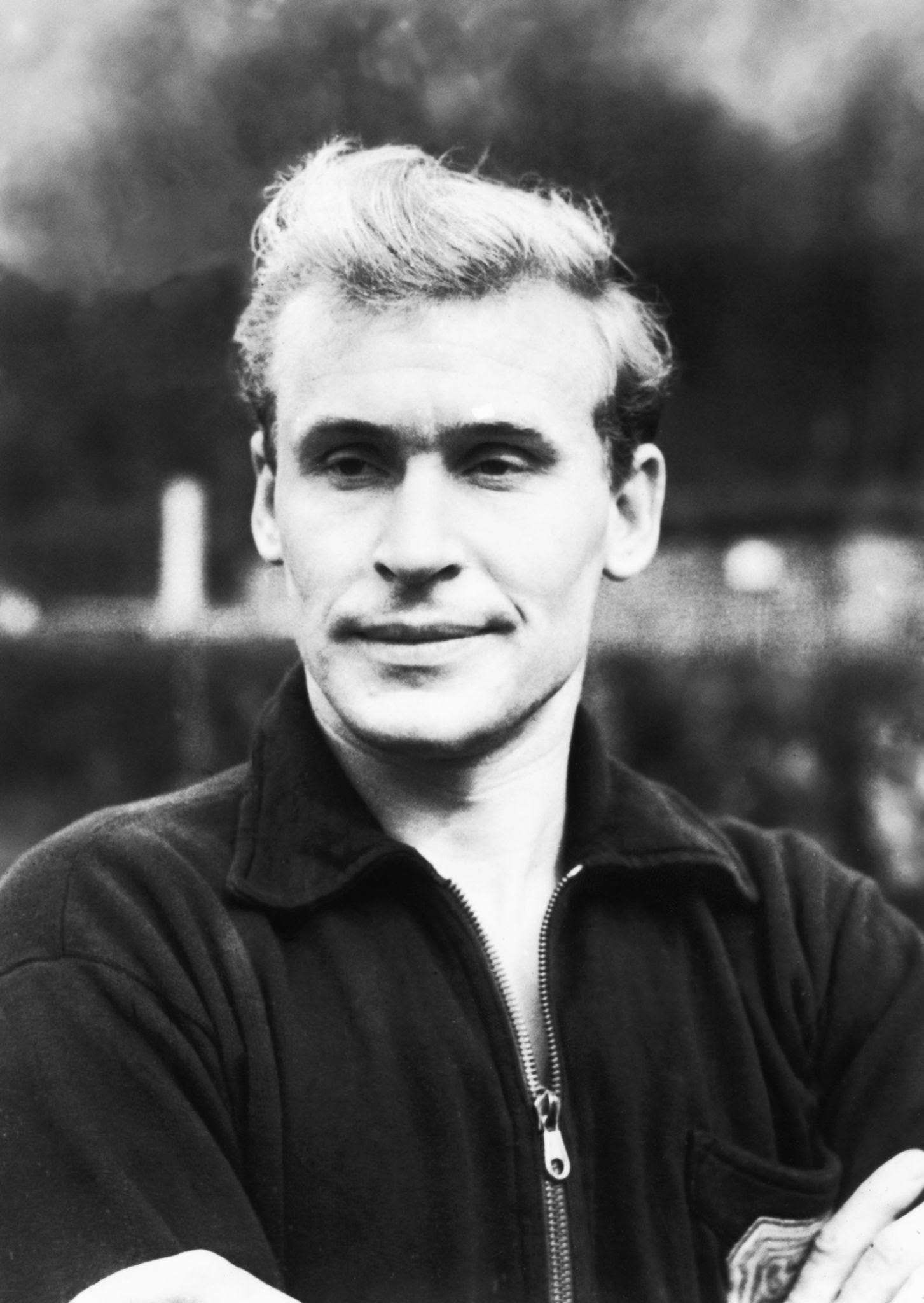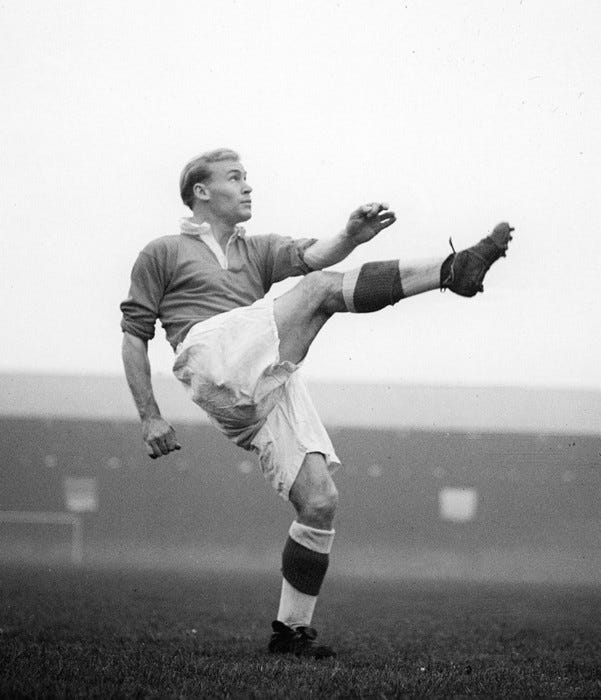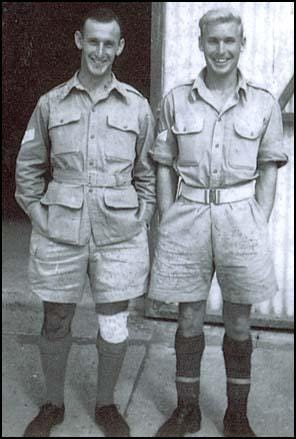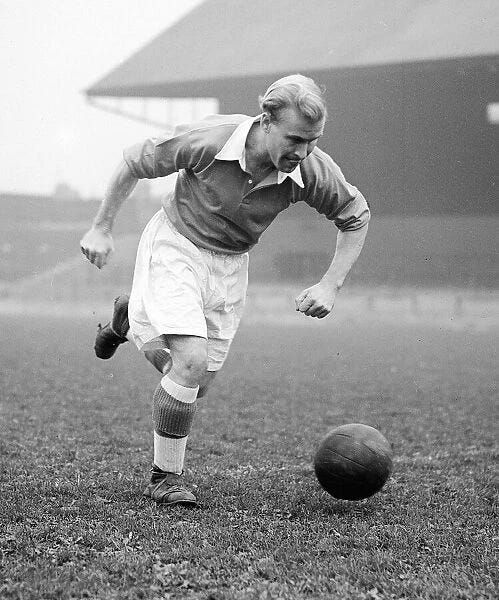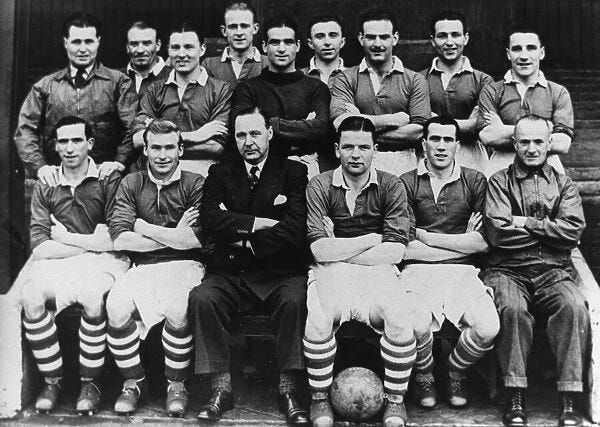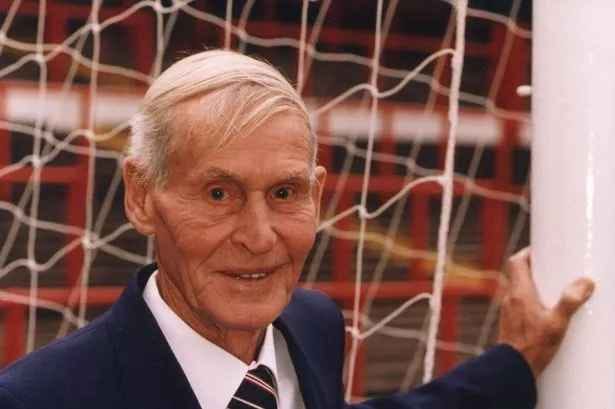Words: James Howell
In an age where every twitch of a player’s foot is captured, GIFed and canonised, only grainy Pathe news footage is left to show what Wilf Mannion was capable of. Anecdotes from grandparents and newspaper clippings remain to tell fragments of how a diminutive inside forward from South Bank, Middlesbrough, became one of the country's finest ever footballers. But memories are fading fast.
The old football grounds in which Mannion, Shankly and Matthews played are all but gone. Clubs have chosen to erect statues to these icons in an attempt to bridge links to past greats but this iconography buries dark truths around football in the post war years.
Wilf Mannion’s story is not a testimony of a footballer achieving greatness and glory, but one of underhand dealings, a rigged system and regulations comparable to serfdom. Mannion’s story is a series of unfortunate turns which led a player of unrivalled ability to be robbed of his own free will at almost every turn. Global politics, ill-health and a stubborn and inflexible system conspired against the Golden Boy of South Bank, whose story is an important brick in the history of English football.
In 1936, after a few back-breaking jobs in the local steel works, Mannion’s life was to be set on an almost unmoveable course. Tommy Mannion, Wilf’s older brother, could be credited with having supernatural foresight after railing against his younger brother for choosing to sign for his hometown club Middlesbrough.
The 18-year-old had made a name for himself representing St Peter’s RC School, as well as showing several dockers and steel workers a clean pair of heels. He signed for a princely £10 signing-on fee, despite interest from Tottenham Hotspurs and Arsenal. There was no way he, nor his parents who actually signed the contract, could have realised the significance of what they’d done, but Tommy unconsciously knew.
It didn’t take long for Mannion to find himself in the matchday XI. After proving he was just too good to be left amongst the reserves, he started on 2nd January 1937 against Portsmouth. Micky Fenton scored two without reply as Boro won at home and Mannion got his first taste of professional football. It was Fenton who was tipped to be the next superstar, ahead of Mannion, mixing with the powerful and prolific George Camsell. The return of Camsell meant Mannion made one more appearance that season, a 2-0 loss away to Preston North End.
The 1937-38 season saw Wilf Mannion secure his place in the side occupying the inside forward position. This position would be most comparable to the 10 position in the modern game, with the aim to supply the centre forward or striker or contribute goals.
Fenton, Mannion and Camsell formed a formidable partnership which saw Boro finish fifth in Division One, just six points behind champions Arsenal. Despite the aging Camsell, who was 35 years old and coming to the end of his career, the future looked bright for Boro’s young stars. However, the writing was on the wall when the England national team started their European Tour at the Olympiastadion in Berlin, Germany. Under pressure from the Foreign office and in view of 110,000 spectators, the England team were coerced into offering a Nazi salute during the pregame formalities.
The following season saw Boro really click into gear. Despite having his call up for England’s summer tour declined by manager Wilf Gallow, the manager’s passion for expressive and enjoyable football meant the partnership of Fenton and Mannion proved lethal. Camsell’s fading presence did not prove too costly as Boro only failed to score in four matches all season and were top scorers in the league with 93 goals.
All teams have their nemesis. Unfortunately for Blackpool FC, theirs was Wilf Mannion.
On 10th December 1938, at just 20 years old, Wilf Mannion cemented his place as one of England’s top prospects. The Tangerines arrived having only won two of their previous ten matches and things were about to get a lot worse. Mannion and Fenton proved to be in sublime form and Boro ran out winners 9-2. Mannion scored four and assisted many, many more.
Joe Smith, Blackpool’s manager, was almost lost for words, telling the newspapers “who could have resisted that Borough team today?” Local papers described the display as an avalanche and reporter, known as Captain Jack, gave the Blackpool goalkeeper man of the match for his efforts to limit the score to single figures when it could undoubtedly have been much more.
Defensive fragility had stunted the team’s title hopes and in May 1939, Middlesbrough finished the season in an improved fourth place, ten points behind champions Everton. Life for Mannion and the rest of the squad was on an upward trajectory, but like many young men of the era life was about to alter forever. Fenton was quoted in Nick Varley’s biography of Wilf, Golden Boy, “we were reaching our peak as a team...there is no doubt that we would have won the championship but for the outbreak of the war.”
Wilf was conscripted to join the Green Howards in early 1940. Football contracts across the country were cancelled but player registrations were withheld by the clubs, in preparation for the post war world. After basic training in Bridlington, it wasn’t long until Wilf was in action. Shipped out to France to help build landing strips for an Allied push eastwards, the Howards were quickly in trouble.
As the Western Front began to crumble, Allied forces were pinned back to the sea at Dunkirk. Had it not been for the evacuation, also known as Operation Dynamo, Wilf Mannion along with approximately 300,000 troops may have perished or been captured.
Following the horrors of the evacuation, The Green Howards and Wilf were rested for several months. A world tour aboard the Sumaria saw Wilf take in the sights of Bombay, Calcutta, Cape Town and FreeTown, before arriving, via the Suez Canal, in Italy. Wilf’s pace and agility were being put to good use as he was made a messenger for B Company under the captainship of famed cricketer Hedley Verity.
After landing near Sicily, a badly executed attack on Axis fortifications saw B Company become the main targets of mortar attacks, machine gun fire and a raging fire started in the corn fields around them. Captain Verity was hit in the chest by machine gun fire and asked Wilf to fetch medics while encouraging troops to “keep going”.
Despite his best efforts, the sun had risen and brought with it a Nazi advance. Captain Verity was captured and later died.
Mannion was lucky to have survived the invasion in one piece, but the emotional scars would weigh on him forever. Speaking to Nick Varley, Wilf said “We lost half the company that day...we were pinned down by the enemy. Hedley was caught in the crossfire and hit in the chest. He was a wonderful man.”
It wasn’t long until Wilf was withdrawn from frontline service. Struck down at various points with jaundice, malaria and exhaustion, he was retired to the Middle East for well earned rest and recuperation. His war was over and his body was broken.
Under the Palestinian sun, future Arsenal manager Bertie Mee took it upon himself to rehabilitate the Golden Boy. It was steady and slow, but eventually he was entertaining the troops with silky displays not seen since before the war.
Wilf Mannion arrived back on Teesside in March 1946, a new man. No longer just a footballer living for 3pm on a Saturday, but older, scarred and with a revised purpose for his future.
The Second World War had robbed Wilf of seven years playing professional football. His return to civilian life brought with it a new focus on stability. At the age of 27, with no tangible experience in anything but football, he could sense the clock ticking louder. The enjoyment from football would contribute to healing the wounds of the war but he would need more for a completely happy life.
Professional league football returned for the 1946-47 season. After a long recovery, Wilf Mannion made his return to football at Villa Park in promising fashion. He scored the only goal of the game in a 0-1 away win. The pre-war promise of Mannion, Fenton and “gentleman” George Hardwick, mixed with promising young players like Harry Bell, gave Ayresome Park reasons to be cheerful about the future. Despite this, Boro finished the season in 10th place, but a long way off champions Liverpool.
The 1946-47 season also saw doors open for Wilf when he received his first England call-up. His first appearance in a fundraiser for the victims of the Burnden Park disaster, Wilf soon exploded onto the international scene.
In September 1946, at Windsor Park in Belfast, over 57,000 people witnessed the birth of a footballing force. It was manager Walter Winterbottom’s first game in charge and he handed debuts to 6 others alongside Mannion, including Tom Finney, Hardwick and Manchester United’s Henry Cockburn.
The newly assembled team was electric, but none more so than Mannion. Boro’s Golden Boy scored a hatrick against Ireland in a 7-2 win. The reports from the time describe the Irish defense as calamitous, but also saved praise for the magnificent Mannion. Throughout the rest of the season, the inside forward cemented his place in the England line up and gained eight more international caps. The increased fame and national adulation began to create problems back on Teesside.
Cracks within the dressing room began to show not long after newly weds Wilf and Bernadette moved into a new house rented to them by the club. The Mannions also received a bonus for five years of service of £750 from the football club. Jealousy began to seep into the dressing room and Mannion, despite his dazzling displays, quickly became an outcast within the squad. His teammates felt so aggrieved they even met with the board of directors to air their views. Mannion was left with few options and handed in a transfer request.
Before Jean-Marc Bosman, before the abolition of the wage cap, before Eastham v Newcastle United 1959, before Jimmy Hill’s PFA, before Neil Franklin, there was Wilf Mannion.
The retain and transfer system existed in English football from 1893 until the 1960s. The system means when a player is registered to a football club, they cannot be registered to play for another without the club agreeing to release their registration. There was no pressure to release a player’s registration. Clubs could release the registration if they receive an agreeable transfer fee. For footballers of the time, it was to play for your registered club or don’t play at all.
Wilf Mannion received £12 a week (£10 in summer), plus bonuses of £2 for a win and £1 for a draw. His club wage combined with a £20 match fee for England meant a very comfortable life for his family but would not provide them with stability for the rest of their lives.
News of Mannion’s transfer request shocked Ayresome Park and excited football directors across the country. The suitors began to circle for the England star but every advance was rebuffed.
“Even if a club came to us with a cheque for £50,000 we would not transfer Mannion. Why would we let the best player in Britain go?” remarked Boro Manager David Jack. He was trapped between a team that actively disliked him, a club that wouldn’t let him leave and a family in need of long term security.
At the time there was of course under-the-counter payments going on in football. Ways around the rules include certain kinds of non-cash, and non-declared, payments such as houses, cushy jobs-for-life or a popular option was leases for pubs on offer when playing days were over. All of these, and many other creative options, made a mockery of the legal maximum signing-on fee of £10 and wage of £12 per week. But for Mannion, none of this was even a possibility without the Middlesbrough FC board’s consent.
Wilf was forced into self-exile and went on strike. At the start of the 1948-49 season he trained with non-league South Bank FC. Just two years after his England debut, Mannion was training among amateurs. Without the salary from playing football, his income was supplemented by writing for the Daily Express.
From the club, rumours of Boro officials threatening to “finish Mannion if he doesn’t sign” began to bleed into the consciousness of the general public. A war of words was underway and neither side was pulling its punches.
Eventually, public opinion began to turn and the club was looking more like the embittered party in this nasty and public dispute. England's performances began to receive criticism for the hole Mannion had left. To placate the situation, by September 1948, Boro began to listen to offers but their terms were stern. They wanted a like-for-like replacement alongside a sizable sum.
Again memories begin to blur as claims and counterclaims are retrieved from the era. Reports and research suggests Boro received offers from the likes of Arsenal, Wolverhampton Wanderers, Burnley, Manchester City and even a record offer of £30,000 from Celtic. The tension between the two parties, and the dubious ways these deals were often carried out, meant that the story can almost never be told in its entire truth.
The most likely destination for Mannion at this point was bizarrely Third Division Oldham Athletic. Wilf and Bernadette took up residence in Oldham and he began training with the lower league side after permission was granted by Middlesbrough. The Mannions tried to set down roots and Wilf took a job selling chicken coops. But back home the transfer arms race was intensifying, so Wilf made an intervention.
In an interview for the Oldham Evening Chronicle, Wilf set a limit of £12,000 for his transfer fee and said he’d refuse to sign for a club which had agreed to pay more. Mannion argued the club had only invested their £10 signing on fee when he signed up at a young age and the playing field needed to be levelled somehow.
The argument also touched on a bubbling sense of distrust that had grown between players and club boards. Since the return of football after World War Two, attendances at football grounds had rocketed. Mannion himself later admitted that players felt short changed after pulling in crowds of between 45,000 to 50,000 people while they were stuck on just £12 a week.
As winter swept in, the Boundary Park fans and its board were getting desperate to finalise the transfer. Various schemes were concocted including re-mortgaging Boundary Park, a local fundraiser and interest free loans from local businesses. Whether the final fee was going to be £12,000 or £25,000, eventually Oldham Athletic accepted the dream of bringing one of England’s elite players to the third division was not going to happen.
January 1949 brought more promise with realistic deals on the table for Aston Villa and Arsenal. The Villa board had promised a variety of means to keep him comfortable, including a work-from-home job with no real responsibility for an extra £25 and other suspicious incentives which would come to light much later.
A representative from Arsenal even made the journey from London to Oldham to continue talks in person, but they would not offer any “extra benefits” for his services. Like the countless false starts before, these again came to nothing. External factors were again about to change the course of Wilf’s life.
The Mannions were starting a new family and, while heavily pregnant, Bernadette began to have serious complications. Doctors insisted Bernadette should be taken into care to ensure the health of both mother and baby, and ideally close to Middlesbrough where Bernadette’s family would be close by. It forced Wilf’s hand. Boro Director Tommy Thomas drove across to Oldham in the middle of the night and the club and player were able to bury their differences.
After eight long months, the saga was over and Wilf had forsaken his stand against the unjust transfer system. Wilf was dealt another cruel hand and understandably put the health of his family first as they climbed into Thomas’s Rolls Royce and headed back to Teesside.
It wasn’t just Mannion who made stands against this unfair system at the time. Neil Franklin, England team mate of Wilf’s, made a bolder move against the status quo and duly felt the wrath of the footballing establishment. In 1950, Stoke City’s Franklin eloped to sign for Independiente Santa Fe in Bogota, Colombia. He received £60 a week and an extraordinary £2000 signing on fee.
The Civil War in Colombia forced the defender back to home shores where he was banned indefinitely by his former club. A commanding and talented defender was also cut adrift from the national side and left to stew for six months in infamy before being sold to Hull City.
Back on Teesside, public statements were made by both Mannion and the club to show any residual animosity had been forgotten, but on Mannion’s return to Ayresome Park he could not hide his face.
Excitement at Ayresome was intensified by an increase of 5000 extra paying fans in the ground for the match against Preston North End. The band playing “For he’s a jolly good fellow” during the pre-match formalities must have stung but he was back playing football.
Mannion’s return was Boro’s first win since, coincidentally, clobbering Aston Villa 6-0 in early December. The season fizzled out and Boro finished in a lowly 19th and one point from safety. Boro had obviously suffered without their star player and Wilf’s heart wasn’t entirely in it.
These conditions for footballers continued for a decade longer. It wasn’t until Jimmy Hill took charge of the Players’ Union in 1956 that things began to change. George Eastham was the latest example of clubs exploiting players.
The newly named Professional Footballers Association took the case to the High Court and won. In 1963, backed by funds from the PFA, the aptly named Justice Wilberforce ruled the retain and transfer system restricted trade and Eastham was free to join Arsenal. It was the first win of many under Hill’s PFA and an effective end to the serfdom of footballers.
Wilf's career wasn’t entirely over by 1950, as he would still go on to represent England at their first World Cup in Brazil.
After showing flashes of his brilliance in the following seasons, the team was crippled by a lack of investment, passing over players like Don Revie and the careers of Fenton (retired) and Hardwick (injury) coming to an end. Sick with football Wilf briefly retired after Boro were relegated at the end of the 1953-54 season.
There was one more twist in the tale for the Golden Boy, now thirty-six. Wilf Mannion signed for Hull City AFC on Christmas Eve 1954 for £4500. Unfortunately for fans at Boothferry Park, the footballing authorities had not finished with Mannion.
During his brief retirement signing for Hull City, Wilf took on a side-line as a columnist for the Sunday People newspaper. Whether encouraged or slightly bitter with his playing career behind him, Mannion began to broadcast allegations of corruption, bungs and under-hand dealings in football. These backroom deals do not tend to leave paper trails and can be hard to prove.
Mannion was ordered to attend a hearing in May 1954 where he would be asked to name and provide evidence for these deals. He declined and was subsequently banned from being associated with any league football club again. He could no longer play, coach or manage, and even if he wanted to, no club would go near him.
As brutal as the sanction was, it did not apply to clubs in the three league structure. He went on to be player manager at non-league Poole Town and even turned out however briefly for the non-league Cambridge United. By then he was nearly 40 and could not physically compete at a professional level even if he wanted to.
A blackened name in football, he was never considered for any management positions despite his vast experience and ability to read a game. By 1964 he was back on Teesside, broke and signing on the dole. Eventually finding work as a tea boy and labourer at ICI, the Mannion family were able to get by, but he faded from consciousness as the game moved on.
However, a local BBC documentary aired in August 1978 sparked a renewed interest in the Golden Boy and to a lesser extent George Hardwick. Older fans lobbied the club for a testimonial but the board hadn’t forgiven Wilf for his indiscretions over 25 years previous. After a change in leadership in 1983, only then was the testimonial given approval. 13,000 fans turned up to watch a Boro side beaten 2-1 by Bobby Robson’s England XI.
17 years later, Wilf Manion died in April 2000, aged 81. In life he was an inconvenience to footballing authorities, a noisy upstart who had ideas above his station, but his story is important in plotting the course of football in England. He should be revered for his ability and dazzling displays, but also remembered for the stand he took and what it cost him.



